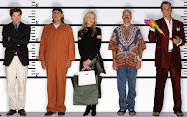
I don't have anything too insightful to add about last night's episode, mainly because it moved the plot forward -- some say in a hurried way, but I say at an appreciated pace. We learned that Charlotte's parents were part of the Dharma Initiative and that she had indeed been on the island before; Daniel visited her when she was a child and warned her that coming back to the island would mean certain death (and I hope the show sticks to the time-travel rules and that, no matter what Daniel says to her, he doesn't change the fact that she dies); the time-travel flashes have been occurring because Ben knocked the wheel of its axis (does this mean the time-flashes won't happen anymore?); Jin gives Locke his wedding ring to convince Sun that he is dead, but when Ben gives the ring to Sun, it is this very item that convinces him he is alive; Eloise Hawkings is in fact Daniel's mother (but is she the same Ellie that was part of the Dharma Initiative and took Daniel to the atomic bomb?); and Kate still sucks.
I thought this episode was very good in answering some of our questions -- how Danielle's men got "the sickness" (from the monster), what "the Temple" looks like (the hieroglyphs say "Underworld") -- and it showed us some awesome scenes along the way, like Smokey ripping off a guy's arm and Desmond encountering Ben. As Alan Sepinwall notes in his recap, there's no reason for Desmond to recognize Ben or to know that Ben is searching down his beloved Penny to kill her as retribution for Charles Widmore killing Alex.

In case you haven't been reading Entertainment Weekly's Lost recaps, I highly recommend that you do so. I believe a team of graduate students must be behind these impossibly thorough connections, all of which are highly educational to the mythos and intelligence of the show. Take for instance EW's insight into Charlotte's further connection with C.S. Lewis, as demonstrated in this week's episode:
''I'm not supposed to have chocolate before dinner,'' she blurted, her mind suddenly elsewhere. And then she was gone for good.Pretty interesting, right? And here's a connection that EW makes to HP Lovecraft's works:
The temptation of chocolate takes us somewhere, too — namely, straight to hell. In C.S. Lewis' first Chronicles of Narnia novel, The White Witch — a stand-in for Satan; the incarnation of death — seduced Edmund into betraying his siblings with an English delicacy made of chocolate known as Turkish Delight. For Charlotte, the Island was her Turkish Delight — her forbidden fruit — and chasing after it led to her doom. ''This place is death!'' she bellowed, and I couldn't tell in that moment if her mind was in the present, speaking of her killer environs, or if it was in the past, passing along something she had been told.
Digging deeper into the Charlotte/Lewis connection, we sinker deeper into an abyss of subtext. Along the way, we pass A Grief Observed, Lewis' chronicle about the death of his companion, Joy, and how it tested his Christian faith. Then, there's The Great Divorce, which actually isn't about marital dissolution but a fantastical vision of the afterlife, à la Dante's Inferno, although it was actually meant as a parable about living in the here and now. (The title is a riff on — and the book a response to — William Blake's surreal manifesto, The Marriage of Heaven and Hell.) These are stories about the underworld, the mythical place where souls hang after they've shed the mortal coil. And now recall the Egyptian hieroglyphics in "The Hatch," which according to the producers of Lost translated into ''Underworld.'' And Smokey's scene-stealing, arm -ripping presence in this episode reminds us that the guy who made the Map in "The Hatch" called the Monster by a different name: ''Cerberus,'' the three-headed demon dog that guarded the gates of Hades. And finally, know that Christian Shepherd, the dude with the Jesus pun name, played the part of ''psychopomp'' in this episode — a ''psychopomp'' being a mythic underworld figure who serves as a ''guide to souls,'' escorting the dead between states of existence.
Actually, forget CS Lewis and his Christian parables. ''This Place Is Death'' felt like an HP Lovecraft horror story to me. Lovecraft was all about fools who go chasing after forbidden knowledge and buried secrets and wind up getting more than they bargained for, if not killed, or worse, driven hopelessly mad. His stories were full of ancient lands hidden away from the world, where malevolent gods and their pet monsters dwell in their ruins and lie in wait for explorers and other lost souls to feed upon or possess. The essential Lovecraft saga is At The Mountains of Madness, about geologists who discover the remnants of an old civilization in Antarctica and stumble into supernatural trouble, including a monstrous, shape-shifting creature called a Shoggoth. What did Faraday say in this episode?

And here's where your mind is about to blow up. I'm not kidding. It. Will. Explode.
Per the precedent set in ''The Constant,'' in which Season 4 Faraday did not remember meeting Time Traveling Desmond in the past until Season 4 Desmond actually made the trip, I don't think Season 1 Rousseau recognized Jin from their Season 5 encounter. Yes, a little confusing, but it's all summed up by the term ''course correction'' which Lost has frequently cited.And in describing the significance of Jin's name, EW explains:
Simply, this means that some kind of omniscient and self-aware agency — God; Fate; Some undiscovered regulatory force — finds a way to sort things out when paradoxes or inconsistencies are created by time travel. This is not merely a writers' contrivance. This is actually rooted in some kind of theory. It is called ''The Principle of Self-Consistency,'' and it was promoted by two eggheads, one named Igor Novikov, and one named David Lewis — and yes, as we learned last season, that also happens to be the name of Dead Charlotte's Dharma Dad.
But it's that Novikov guy who's about to flip your lid. In 1991, in a journal called Classical and Quantum Gravity, Novikov and another dude named Andrei Lossev wrote a big paper about time travel called — drum roll please! — ''The Jinn of the Time Machine: Non-Trivial Self Consistent Solutions.'' The purpose of the paper was to describe various solutions to paradoxical problems created by time travel. Here's an example of one such paradox — taken from a book I found called The New Time Travelers — that I believe speaks to the larger plot of Lost. Let's say a writer wants to write a novel. So he builds a time travel machine, goes to the future, buys a copy of the novel he wrote, then brings it back. Easy. Except who created the novel if the author really didn't write it?
The term ''Jinn'' is another word for the kind of genies you might find in Arabic fairy tales. Novikov and Lossev used the term Jinn to describe things like that magical novel I mentioned earlier — things whose existence defy conventional explanations. According to the mysterious author of The New Time Travelers, Novikov and Lossev were drawing on the depiction of a kind of Jinn that you find in the Koran; they are ''a race of spirits that can appear suddenly and unexpectedly.''Lost, I may have been short with you in the past -- a bit impatient, with a lot of eye-rolling and sighs -- but I'm 100% back on board. Take me wherever you may lead.
A race of spirits that can appear suddenly and unexpectedly. Just like Jin in last night's episode. Just like Christian Shepherd in last night's episode. And just like Desmond in last night's episode — Desmond, whom Faraday in the season premiere called ''miraculously unique.'' Just like a Jinn.









.jpg)


No comments:
Post a Comment